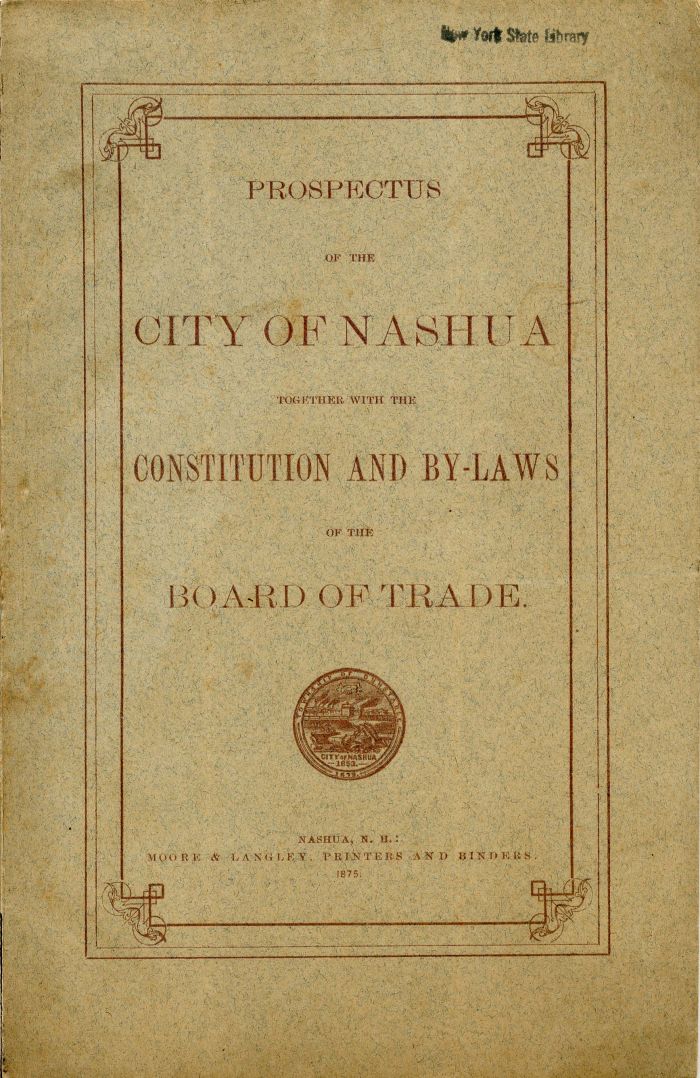City of Nashua Constitution and By-Laws - Booklet
Inv# AM1539
19 page prospectus of the City of Nashua printed by Moore & Langley, Printers and Binders. Includes map of "Nashua and it's railroad connections".
Nashua is a city in southern New Hampshire, United States. As of the 2020 census, it had a population of 91,322, the second-largest in northern New England after nearby Manchester. Along with Manchester, it is a seat of New Hampshire's most populous county, Hillsborough.
Built around the now-departed textile industry, in recent decades Nashua's economy has shifted to the financial services, high tech, and defense industries as part of the economic recovery that started in the 1980s in the Greater Boston region. Major private employers in the city include Nashua Corporation, BAE Systems, and Teradyne. The city also hosts two major regional medical centers, Southern New Hampshire Medical Center and St. Joseph Hospital. The South Nashua commercial district is a major regional shopping destination, lying directly on the Massachusetts border and taking advantage of New Hampshire's lack of sales tax. It is anchored by the Pheasant Lane Mall and numerous smaller shopping centers.
Nashua was twice named "Best Place to Live in America" in annual surveys by Money magazine. It is the only city to get the No. 1 ranking on two occasions—in 1987 and 1998.
The area was part of a 200-square-mile (520 km2) tract of land in Massachusetts called "Dunstable", named after Edward Tyng of Dunstable in England. Located at the confluence of the Nashua and Merrimack rivers, Dunstable was first settled about 1654 as a fur trading town. Nashua lies approximately in the center of the original 1673 grant. In 1732, Dunstable was split along the Merrimack River, with the town of Nottingham (now the town of Hudson, New Hampshire) created out of the eastern portion. The previously disputed boundary between Massachusetts and New Hampshire was fixed in 1741 when the governorships of the two provinces were separated. As a result, the township of Dunstable was divided in two. Tyngsborough and some of Dunstable remained in Massachusetts, while Dunstable, New Hampshire, was incorporated in 1746 from the northern section of the town.
Like many 19th century riverfront New England communities, New Hampshire's Dunstable was developed during the Industrial Revolution with textile mills operated from water power. In 1823, the Nashua Manufacturing Company was incorporated. The company eventually had four mills and employed approximately 1,000 people. The following year, the Jackson Manufacturing Company was incorporated.
In 1836, the New Hampshire half of Dunstable was renamed "Nashua", after the Nashua River; the Dunstable name lives on across the Massachusetts border. The Nashua River was named by the Nashaway people, and in the Penacook language it means "beautiful stream with a pebbly bottom", with an alternative meaning of "land between two rivers". In 1842, the town split into two towns. Eleven years later, they joined back together under the name "Nashua". During the split, the northern area, known today as "French Hill", called itself "Nashville", while the southern part kept the name Nashua.
Six railroad lines crossed the mill town, namely the Nashua and Lowell, Worcester and Nashua, Nashua and Acton, Nashua and Wilton, Concord and Nashua, and Rochester railroads.
Like the rival Amoskeag Manufacturing Company upriver in Manchester, the Nashua mills prospered until about World War I, after which a slow decline set in. Water power was replaced with newer forms of energy to run factories, such as coal, and cotton could be manufactured into fabric where it grew, saving transportation costs. The textile business started moving to the South during the Great Depression, with the last mill near Nashua closing in 1949.
But then Sanders Associates, a newly created defense firm that is now part of BAE Systems, moved into one of the closed mills and helped restart the city's economy. Sanders Associates also played a key role in the development of the home video game console market. Ralph H. Baer, an employee of Sanders, developed what would become the Magnavox Odyssey, the first commercial home video game system. The arrival of Digital Equipment Corp., now part of Hewlett-Packard, in the 1970s made the city part of the Boston-area high-tech corridor.










Ebay ID: labarre_galleries